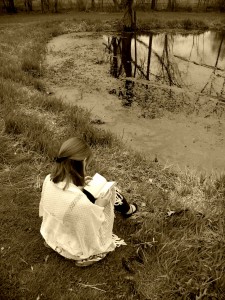
Aack! The year is half over. How did that happen? If you’ve spent the past six months thinking about the book you want to write, this is a good time to get started. And where do you start? With the FIRST PAGE. Here’s what the Mavens have to say:
CHERYL ZACH: First Pages are vital. You must catch the reader’s interest at once. Years ago I heard award-winning author Richard Peck say that he used to give himself ten pages to grab the reader’s attention; now it must be done on the first page. And it’s not just a restless young person you must mesmerize–it’s also the agent or editor who will be your first reader. If your book makes it to print, it’s the book store buyer or the clerk who puts it on the shelf, or it’s the parent of a young child if your book is a picture book. First pages matter.
For a young adult novel, on that essential first page you need to establish who the main character is, give at least a hint of the problem and the setting. Sound hard? It is. The first page will go through innumerable drafts. You’ll write it, edit, rewrite many times. Read it aloud, read it to your critique group. Write it again. Hone it, tighten it. For sure tighten it. Every word counts. {Do not do an info dump–try to tell too much on what the book is about, as if you were giving a book report. You want to show; use action, dialogue, sensory details. Bring the story to life immediately.)
Go back through your most loved novels or picture books. Old favorites are allowed, but be sure to read many new books, too. See what the current best sellers are, what editors and readers like today. See what skillful writers can do with a few lines, a couple of paragraphs, to grab you by the throat and not let you go.
LAURIE KNOWLTON: What’s so big about first pages?
First pages are not EASY. They need a great deal of thought and rewriting, and rewriting.
Riveting first pages are imperative because they introduce your reader to the main character, the setting’s time and place, and a story problem, quest, or journey.
Your opening line should GRAB your reader making them want to read the next line, and the next line, and the next line. In those lines the writer needs to make the reader care about the main character and what they are up against. The reader needs to feel the conflict. A good way to do this is through strong sensorial action and dialogue that fills in the gaps.
Your first page is either going to keep your reader reading or putting down the book and moving onto something else, or someone else’s book. Don’t let weak first pages keep your reader from consuming your book!
DAWNE KNOBBE: First pages usually become a page further into your chapter. Don’t be afraid to “cut to the chase.”
STEPHANIE JACOB GORDON: Eve Bunting always said: “Start with the moment that’s different.” That means the event that makes your character take notice and react. That moment should be important to your character, make a difference in his/her life, create a situation where something is at stake for the character. The reaction may be physical or emotional, but it should be something that will hook your reader and create a page turn in order to find out what happens next.
JUDITH ROSS ENDERLE: Don’t be surprised if you toss out your first page or even your whole first chapter once you’ve completed your first draft. That’s a lot of firsts, but sometimes you don’t know if you’ve started in the right place until you’ve found out where your story ends.
Happy summer! Happy writing!
